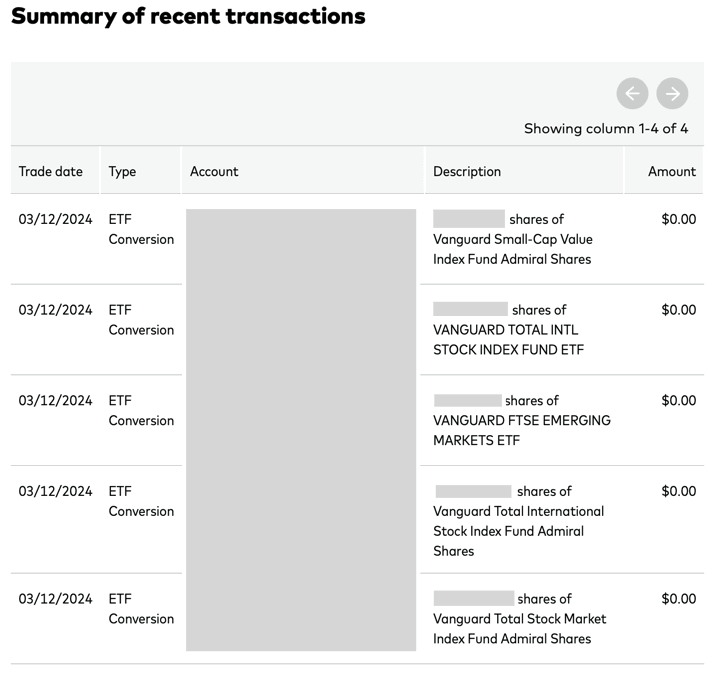I recently decided to convert my Vanguard mutual fund shares into each of their respective ETF equivalents. These were all held inside a Vanguard.com brokerage account. I remember first considering this mutual fund to ETF option way back in 2010 (aspects of that article may now be outdated). Instead of covering all of the possible decision factors, here I’ll just document my own personal factors and my experience completing the process.
Why did it take 14 years for me to convert my Vanguard mutual fund shares?
Back in 2010, here was my rationale for staying put:
- I had no plans to ever leave Vanguard as my primary brokerage custodian. Everything worked well enough; I had no complaints. My personal financial situation was also relatively simple.
- Vanguard was still simple. Minimal annoying fees. Things were somewhat barebones but everything worked for the most part. A human answered the phone relatively quickly. They sent me paper statements for free. My account only allowed mutual funds, no individual stocks. Vanguard had the vibe that “We’re different and that’s fine. People aligned with our views will find us.”
- The expense ratios for ETFs and mutual funds were either identical or nearly idential and both had the same tax-efficiency due to their share class construction. For a long time, the Admiral and ETFs remained at pretty much the same cost. When you buy ETFs, there are also bid/ask spreads and premiums/discounts to NAV to navigate. Any tiny difference in performance could be wiped out by all this “noise”.
- I preferred the simplicity and ease of dollar-based transactions. For example, back then if I had $1,000 to invest in VTI, at the current share price of $256, I would only be able to purchase three VTI shares and the remaining would remain in $232 cash.
Fast forward to 2024, and things were a little different:
- I am seriously considering leaving Vanguard as my primary brokerage custodian. This came after a few frustrating incidents and long hold times, in which I felt that it would be easier on my spouse if our assets were located at a place committed to top customer service. Essentially, an estate planning issue after handling my parent’s finances. There are definitely good and helpful people at Vanguard, but the level of service is not nearly as consistent as with Fidelity. If I consolidated, then there would also be one less major account to manage. Many outside brokerages won’t trade Vanguard mutual funds (besides full sales), so this was the main reason for converting to ETFs.
- Vanguard is trying to grow assets as hard as everyone else. Vanguard still has a low-cost structure, but now it just seems like it wants more, more, more. The CEO is leaving under questionable circumstances without a replacement ready from within, so they are likely hiring an outsider. (Tim Buckley started as Jack Bogle’s research assistant 33 years ago!) The Vanguard now serves me more browser pop-up windows (e-statements) and upsell ads (Advisory services) than both Fidelity and Schwab. For example, Fidelity mails me paper statements free. This is helpful for older people that may lose track of accounts. Vanguard wants $25 a month unless I have $5 million. I feel this shows that at Vanguard, low costs are more important than good customer service. In that case, why not simply own Vanguard ETFs inside a Fidelity brokerage account? If Vanguard hires an outsider CEO from another brokerage company, I’m most likely out.
- The expense ratio spread has widened slightly to the range of 0.01% up to 0.06% (VWO). This is still not a big deal to me, but it is apparent that Vanguard gave up trying to maintain parity and in the future the ETFs will always be cheaper. The trend is a wider gap over time, not a narrower one. I rarely sell (or even buy) these days, so I have minimal transaction costs.
- Vanguard now supports fractional share ownership for ETFs. Today, If I had $1,000 to invest in VTI, at the current share price of $256, I would be able to invest every penny and end up with 3.906 shares of VTI. Therefore, even if I do stay with Vanguard, I can still perform dollar-based transactions. The conversion is not a taxable event, so there is no tax impact.
Which Vanguard mutual funds can your convert? Although it hasn’t been updated since 2019 and thus may be outdated, this Vanguard PDF listing which mutual funds are convertible to ETFs may still be useful. Here are the specific mutual fund and ETF pairings (with expense ratios) that I converted and their expense ratios as of March 2024:
- Vanguard Total Stock Market Index: VTSAX (0.04%) to VTI (0.03%). Difference of 0.01%.
- Vanguard Total International Stock Index: VTIAX (0.12%) to VXUS (0.08%). Difference of 0.04%.
- Vanguard Small-Cap Value Index: VSIAX (0.07%) to VBR (0.08%). No difference.
- Vanguard Emerging Markets Stock Index: VTIAX (0.14%) to VWO (0.08%). Difference of 0.06%.
- Vanguard Intermediate-Term Treasury Index VSIGX (0.07%) to VGIT (0.04%). Difference of 0.03%.
Again, the absolute differences in expense ratios aren’t that significant in my opinion unless you are talking in the millions. But the direction of the trend is pretty clear, and I do hope to have millions in each eventually. ?
Quick rundown of actual conversion process:
- Download all cost basis information. You should log into your account and download all of the cost basis information for all your mutual fund shares. This is especially true for non-covered shares. The cost basis for covered shares should carry over, but it’s better to be safe.
- I had to call Vanguard on the phone to initiate the conversion. Use the phone in your account or try 866-499-8473. (I could not find a way to do it online.) It took a couple jumps to find the right person, but after that the process was straightforward. As long as the request is entered before market close, it should go through at the end of that same day. Otherwise, it’ll be the next day. You will acknowledge that this is a one-way, non-reversible conversion. Again, you are not selling anything, so there is no taxable event.
- The next day, my shiny new ETF holdings were available in my account. and I was also able to confirm that all of the tax lots for cost basis carried through without an issue. The conversion was done at the net asset value (NAV) of the funds at market close. All of my mutual fund shares were converted, and I was issued fractional shares of ETFs.





